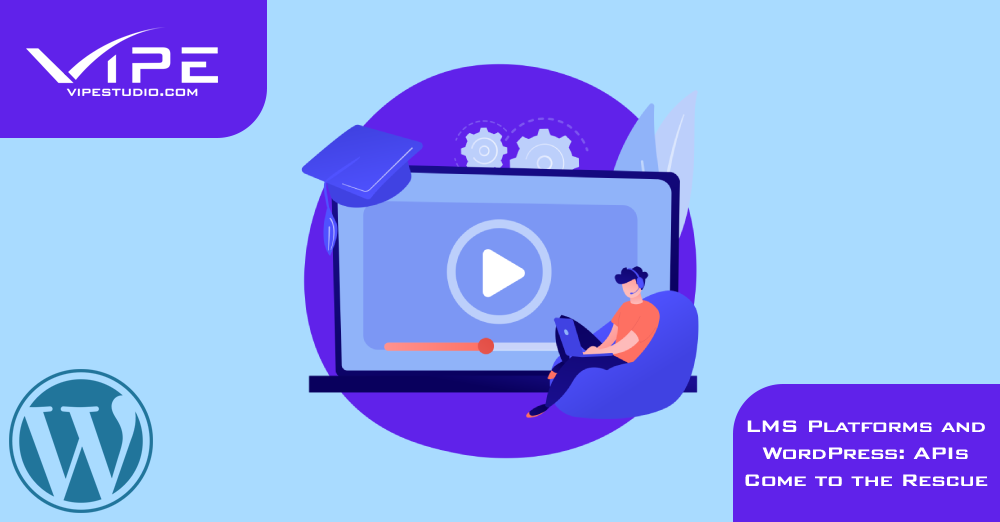01.03.2023
WordPress Development
LMS Platforms and WordPress: APIs Come to the Rescue
READING TIME: MIN
Table of Content
Our Enterprise WordPress Agency for Development is quite certain that you all remember the pandemic – aside from all the troubling and overwhelming news we were constantly witnessing, we also spent a great majority of our time at home doing our best in those hard times. Among the numerous activities, people directed their attention to online learning – hence, the LMS platforms truly skyrocketed!
From then on, eLearning has definitely turned into a trend that is promising to be here to stay – many educating companies and enterprises saw the potential of distributing their efforts online and reaching tremendous amounts of users in search of the next course or seminar to add up to their portfolio of expertise. It’s no wonder that so many people prefer online learning – they were quick to realize the hundreds of benefits it offers.
However, in order for the e-learning process to be running smoothly and issue-free, there are certain aspects that definitely need to be taken care of. Since we’re referring to online services, certainly the topic of web development enters the picture.

Our Enterprise WordPress Agency for Development is welcoming you in today’s article, where we’d dive deep into the subject of LMS creations, as well as what tools and integrations are the most necessary to be featured. Prepare to enter the world of excellent eLearning experiences!
What Makes LMS Platforms So Popular and How Can They Benefit Everyone – Both Learners and Teachers?
In a world where almost every service could be easily obtained online, it was only natural for the whole aspect of learning and education to take the shape of a digital experience.
Our Enterprise WordPress Agency for Development was lucky enough to observe from close the entire process of creating and establishing eLearning platforms thanks to WordPress. After all, the CMS has proven to be the number one choice for millions of users representing different businesses – and eLearning isn’t at all an exception. The scalability, optimization features and hundreds of integration possibilities quickly manage to turn WordPress not only into the best platform LMS-related but the best platform for virtually any kind of website. However, as our focus today is directed at eLearning, let’s discuss some of the reasons eLearning platforms have gained so much popularity among people willing to elevate their expertise:
- eLearning allows people to access their educational resources whenever they want and can – as opposed to attending courses in physical locations (which often requires time in traffic, rescheduling to-do lists and overall engagement), studying online allows people to more easily navigate through their busy days. Having flexibility when it comes to attending classes in fact has the potential to greatly increase everyone’s motivation to study.
- Studying online also helps people learn from every location – essentially, this also boosts motivation and determination simply because it allows students to implement various types of planning at once.
- LMS platforms oftentimes include many types of courses which furthermore increases everyone’s choice in terms of what they wish to be studying.
- Multiple teachers could easily access the eLearning’s website which means increased teams in terms of professionalism and expertise
- Students could easily communicate with each other via inner tools such as forums, chats and student groups
- The opportunity to attend exams online is also something that is extremely beneficial when it comes to eLearning
- Learn and study on the go as many LMS platforms successfully opt for mobile apps that can accompany you everywhere and anytime
As we can see, opting for an LMS platform comes with multiple advantages that are hard to be overlooked – these days more and more people truly prefer submerging themselves in such an experience.

However, in order for the entire process to run smoothly and bug-free, many aspects need to be taken into consideration, starting from the web development journey. If the platform showcases multiple instances of crashes and issues, people would quickly find themselves disturbed and stopped from interacting with the platform the best way possible. Essentially, this would quickly lead to clients leaving and aiming at competitors’ businesses.
Luckily, our Enterprise WordPress Agency for Development has great experience precisely with establishing LMS platforms. Our work has taught us this and that when it comes to opting for useful and much-needed integrations whenever we refer to eLearning systems. In order for an online studying experience to be done right, numerous considerations must be taken in the functionality and accessibility department.
That’s Where APIs Enter the Picture
As we all well know, an API is a piece of software that virtually connects two platforms and enables them to communicate effortlessly in terms of exchanging data.
For example, in WooCommerce stores, we often witness payment integrations with third-party services. The API serves as the communicational bridge between the website and the client’s bank, exchanging information in terms of the order finalization – essentially, that’s the money transfer between the client’s bank account and the website.
In LMS platforms, we can use APIs when we need to feature additional tools and integrations in order to further enhance the client’s experience. What’s more, APIs are less time and effort-consuming– instead of web developers thinking of complex ways in which to implement a certain integration, the API can quickly do that without much hassle.

So, without any further ado, let’s quickly get to some of the most-needed functionalities you can easily integrate with your LMS website with the help of an API.
APIs That Are a Must When It Comes to LMS Platforms
It’s Essential to Feature an Integration That Allows Voice and Video Recordings
Oftentimes eLearning has to do with classes that need their students to participate in verbal communication – imagine taking a foreign language class when you need to showcase your pronunciation, engage with dialogues or prove your learning level. There are APIs that allow the LMS students to record themselves, both in audio and video, and then those files are successfully integrated with the platform for further engagement and evaluation. That’s perhaps the best way in which both students and teachers can interact with each other via the platform in terms of achieving better results and learning experiences. Poodll is an extraordinary tool for precisely that matter.
Don’t Forget to Include Payment Integrations
Numerous LMS platforms operate with subscriptions and all of them, in fact, operate with online transactions when it comes to students paying for their education. That said, including a payment integration with the help of an API greatly eases the entire process of placing orders and booking your next lesson. Payment APIs also monitor subscriptions and send invoices, among other things. The payment API will certainly get your LMS covered. One of the most important software platforms used in the field is Stripe so its API can certainly elevate the payment experience.
Always Opt for Fun Ways to Come Up with Testing Methods
We all know that tests and exams are a crucial part of every educational process and eLearning platforms make no exceptions. Integrating a tool that helps teachers come up with useful and interactive testing is a very important step that aims at showing each student’s progress. The ClassMarker API allows teachers to add features such as video and audio and includes multiple-choice answers, while the API ensures real-time test results for an even smoother and more elevated learning experience.

There Are Numerous Options for Virtual Classrooms in LMS Platforms
For example, Google Classroom API is perhaps one of the most popular methods to manage curriculum, communication between students and teachers and overall distribution of the courses’ material. Opting for an API of this sort can surely greatly elevate the entire experience and make studying online quite an enticing adventure for everyone involved.
Of course, those are just a handful of all possible API solutions that could be integrated into an LMS platform. Our Enterprise WordPress Agency for Development is here to remind you that consulting with a specialist can greatly boost the entire project’s end goals and help developers come up with great solutions when it comes to establishing a truly working eLearning website that gathers and unites people who are driven to gain additional expertise.
Don’t hesitate to give us a call if you’re about to launch your LMS platform – we’d be delighted to assist you and together discuss some of the best practices that can help you reach success in the long term.
More on The Topic
- Leveraging WordPress REST API: Transforming Data Handling
- Navigating WooCommerce Performance: Real-World Strategies
- The Role of AI in WordPress Development Workflows
- Optimizing WordPress for Enterprise: Beyond Basic Caching
- WordPress and Headless Commerce: A Provocative Dilemma
Tags: API integrationLMS platformsWordPress and LMS
The content of this website is copyrighted and protected by Creative Commons 4.0.



